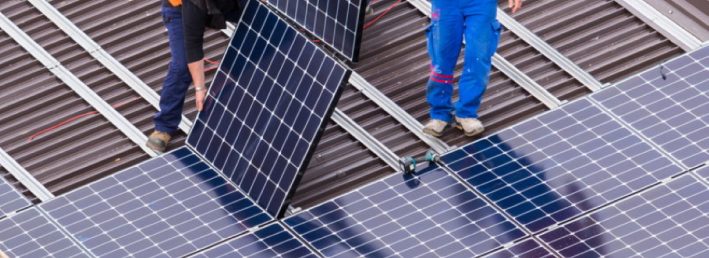By 2050, the United Kingdom has a target to cut emissions of CO2 by 80%. Yet, the government realises it is already way off target. A question we could ask is why aren’t all new build homes built with solar panels as a requirement? If new build homes had solar panels and the ability to store energy in batteries, the country would certainly benefit from a reduction in emissions of carbon dioxide. The more energy we harness from the sun, the less we need to get from other means i.e. fossil fuels.
Benefits to homeowners
When a home already has solar panels it has an excellent selling point. When you move into a property with solar panels, you really begin to notice the benefits. Solar panels mean that a household can enjoy certain parts of the year being completely self-powered, meaning there should be a significant reduction in their energy bills.
New law
Recently, there has been a law introduced which means that solar businesses and homes that create and export electricity will be paid by suppliers. The SEG (Smart Export Guarantee) means that any small-scale electricity generator (like wind or solar, for example) will receive a payment for every unit of electricity they sell back to the grid. This is tracked on smart meters.
Efficient homes
Obviously, there are differences between types of homes that mean some are more apt for solar panels than others. For example, some roofs might be facing in directions that aren’t as efficient for solar panels.
Scotland’s example
In 2015, in a bid to reduce CO2 emissions, the government in Scotland brought in new regulations encouraging developers to fit solar panels. The CO2 emissions can be assessed with government-approved software (SAP2012). Designers can also use different reduction techniques like insulation, heating systems, low-energy lighting and air-tightness to help lower emissions of new builds.
This approach isn’t prescriptive and it means that the construction industry can combine different measures to lower carbon emissions in whatever way suits them – this is often whichever is the cheapest means to do so.
Changing attitudes
Attitudes towards climate change are certainly moving but at the moment the UK government doesn’t seem to be changing regulations enough and it is down to local councils to put in and enforce change. Local councils do have the power to enforce new requirements for new builds and solar panels can certainly help to achieve more environmentally friendly construction.
Benefits to solar panels on new build homes
Solar panels are an expensive installation and, at least for existing homeowners, the cost of installation won’t be paid pack in electricity bills for many years. However, new build properties have the advantage of the cost already being incorporated before the customer buys the house.
Realistically, if solar panelling is the way we are heading in the UK, this needs to start with new builds. It is vastly cheaper to install solar panels on a new property that it is to fit them retrospectively after a family moves in. Having mandatory requirements for solar panels on new homes means that installation costs are lower and homeowners can save money as soon as they move in.
Can a home run entirely on solar power?
Extraordinarily, the sun provides the earth with more energy in a single hour than the entire globe uses each year. This, however, is somewhat misleading because how much of the sun’s energy we can actually harness depends on your location, the time of day, the season and, of course, the available technology. Nevertheless, could a home run entirely on solar power?
Solar energy comes to us in the form of heat and light. We can convert this with technology into useful purposes. For a house, you could capture solar energy in three ways:
- PV (photovoltaic). This uses silicon and can convert light from the sun’s rays into electricity.
- Solar thermal. This uses the principle of the ‘greenhouse effect’ to produce hot water
- Passive solar energy. This is light energy that is captured by the house itself without the need for technology – in other words, sunlight that passes through windows to warm the inside air.
In the past, many people thought that the United Kingdom didn’t have enough sunshine for solar power to be worth the investment. However, the recent uptake of solar panels in solar farms and on house roofs has proven that even in this country, we can use solar energy viably.
What about PVT?
Somewhat new on the scene are PVT panels. These are photovoltaic thermal panels that can generate both heat and electricity. They look the same as the PV panels but these have heat exchangers on their backs.
It’s often assumed that the bright summer sun is best for solar energy production but actually, photovoltaic panels are much more efficient when it is cold but sunny. As PV panels warm up, they are less efficient. In bright sunshine, a PV panel can reach up to 80 degrees Celsius. Whenever a PV panel is a degree over 25 degrees, it loses 0.5 per cent of its efficiency. In the height of summer, therefore, a panel can be up to 25 per cent less efficient than during the cooler months.
Conclusion – should solar panels be a requirement for new homes?
Absolutely! If we want to reduce our carbon emissions, having solar panels as a requirement would contribute positively to the dire situation we find ourselves in with regards to CO2 emissions in this country!


